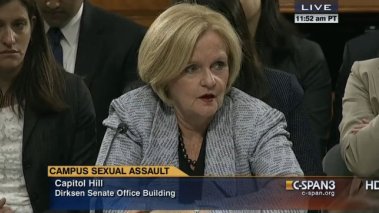Table of Contents
Reviewing the Senate Subcommittee’s Report on Campus Sexual Assault Policies

Last week, the U.S. Senate Subcommittee on Financial and Contracting Oversight’s Majority Staff released a report (PDF) examining college and university responses to allegations of sexual assault on campus. Commissioned by Senator Claire McCaskill, the report bases its analysis on a survey of 440 institutions conducted earlier this year, also commissioned by Senator McCaskill.
The report provides further evidence of the readily apparent inability of colleges and universities to fairly and effectively adjudicate criminal misconduct, but disappointingly fails to acknowledge the serious due process concerns presented by recent mandates imposed by the Department of Education’s Office for Civil Rights (OCR). This failing is perhaps unsurprising. FIRE has criticized Senator McCaskill’s recent roundtable discussions regarding sexual assault on campus for failing to include any civil libertarian voices, and the report’s focus is similarly asymmetric.
For example, “due process” is mentioned just twice in the report, and even then only in making the argument that institutions “afford certain due process elements more frequently to alleged perpetrators than they do to survivors.” The report’s support for this surprising assertion is very thin, providing precious few examples of this alleged imbalance. For instance, it’s hard to imagine that reasonable readers will find the fact that “82% of schools allow alleged perpetrators to challenge hearing members regarding impartiality or conflicts of interest, while only 78% provide the same right to survivors” as persuasive evidence of schools paying too much attention to due process on campus. And of course, any fair-minded review of FIRE’s archives, university policies, OCR mandates, or recent headlines will provide plenty of evidence to the contrary.
Indeed, the report actually demonstrates the continued failure of colleges and universities to provide even the most basic due process protections to students accused of one of humanity’s most heinous crimes. Section F of the report’s appendix documents a host of obvious due process failures. For example, according to the survey, 8 percent of institutions fail to provide the accused student the right to be informed of the outcome of the disciplinary proceeding; 13 percent report that they do not give the accused written notice of the charges prior to the hearing. A quarter of the schools surveyed deny the accused the right to have an adviser present at the hearing, and 14 percent deny him or her the right to be present at the hearing at all. A third of schools surveyed do not grant the accused the right to call and question witnesses, and 63 percent allow hearsay as evidence. Shockingly, 6 percent of institutions surveyed acknowledged that they fail to presume the accused innocent until proven guilty. And due process guarantees for accusers were not all that much better.
FIRE is not alone in criticizing the report for its refusal to acknowledge due process concerns. Ada Meloy, general counsel for the American Council on Education (ACE), perhaps the nation’s most prominent higher education lobbying organization, told the press that she was “greatly disappointed” by the report, in part because it “treats the rights of the accused as an afterthought, which colleges and universities clearly cannot do.” (When the surveys were sent to institutions earlier this year, ACE found itself the subject of pointed, public criticism from Senator McCaskill for offering its member institutions advice on how and whether to respond.) Similarly, noted student conduct authority Dr. John Wesley Lowery called the survey itself “subpar,” clarifying in a response to me that he characterized it as such because of what he perceived to be “[p]oorly worded questions” and the “[m]isinterpretation of results or over interpretation of the results” that followed in the report.
The report’s release comes as Senator McCaskill readies legislation concerning campus adjudications of sexual assault, reportedly to be introduced later this summer. Unfortunately, the Senator has indicated publicly that she will seek to codify in a federal statute OCR’s mandate that colleges and universities use the low “preponderance of the evidence” evidentiary threshold when adjudicating allegations of sexual assault. As Torch readers know, FIRE has long opposed the use of the preponderance of the evidence standard, our nation’s lowest standard of proof, in campus sexual assault hearings. As my colleague Joe Cohn has observed, the preponderance of the evidence standard may be appropriate in some civil cases, where defendants are ensured a host of legal protections, but it is woefully inadequate in the campus context, where the accused have no comparable protections.
FIRE will continue to monitor further developments closely and will analyze any proposed legislation here on The Torch. For more reaction to McCaskill’s report, check out KC Johnson’s response at Minding the Campus.
Recent Articles
FIRE’s award-winning Newsdesk covers the free speech news you need to stay informed.

Texas tramples First Amendment rights with police crackdown of pro-Palestinian protests

Here’s what students need to know about protesting on campus right now

Kansas takes a stand for intellectual freedom
